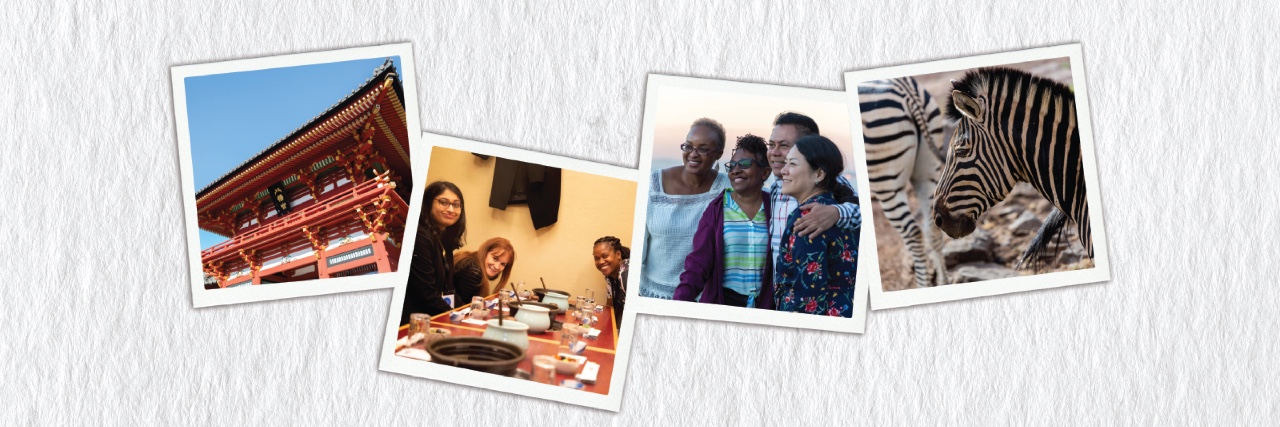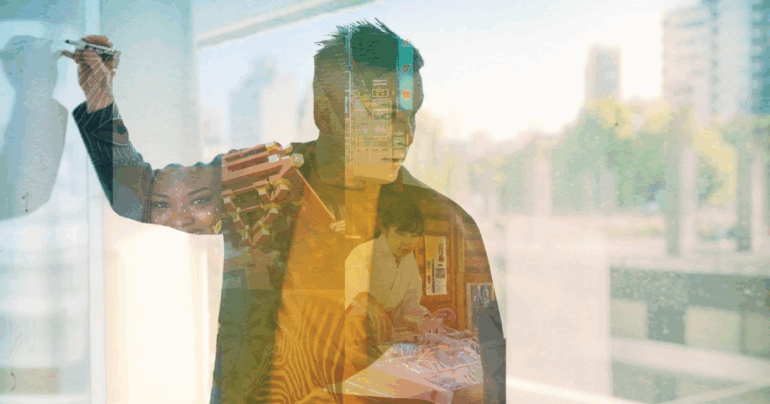BY LAUREN DIXON
Studying abroad has long been an important part of higher education, allowing students to immerse themselves in diverse cultures, gain firsthand experience with pressing global issues, and develop a deeper understanding of the interconnected world around them. But at The Chicago School, most students are full-time working professionals; they often can’t get away to travel for a whole semester.
Thus, faculty-led study abroad programs at the school offer a unique way for students to engage with international issues while balancing the demands of their professional lives. The eight-to-10-day trips are more within reach, allowing students to gain real-world insights into education, mental health, and community development without requiring them to leave their careers behind.

Through the study abroad programs and other international explorations led by Alisha DeWalt, Ph.D., Katherine Green, Ph.D., and Kelly Torres, Ph.D., students at The Chicago School have explored Indigenous culture and identity in Australia and confronted the realities of displacement in Greece and Cyprus. Dr. Green and Torres have also traveled to East Africa, training educators in Tanzania to use trauma-informed play. These programs have benefited not only the students involved but also the communities they visit.
Dr. Torres says many nongovernmental organizations (NGOs) don’t want to meet with schools for a one-off training experience but instead want continuity and a commitment to a continued partnership. Adds Dr. Green, affiliate professor of educational psychology and technology at The Chicago School, “We feel passionately that we shouldn’t just pop in, talk to people, and leave.” By fostering sustained partnerships, these programs support local initiatives, making a lasting impact and reinforcing the idea that global learning is a two-way exchange of ideas and opportunity.

Engaging With Indigenous Culture in Australia
Dr. Green and Dr. Torres also led a study abroad to Australia, visiting various organizations to provide students an understanding of Indigenous populations and the political, educational, and cultural landscape of Australia. These included a visit to One Door Mental Health, a community-based organization that provides services for people living with mental illness, for discussions about workplace wellness and other prominent mental health initiatives in Australia; perspectives from ID. Know Yourself about how Aboriginal populations approach self-discovery and personal development; and a service-learning activity with Our Big Kitchen that provided more than 60 meals for the local community.

“Students explored the intersection of psychology, education, mental health, and organizational practices across diverse educational and professional contexts with a special focus on the diverse cultural fabric of Australia’s indigenous populations,” Drs. Green and Torres say.
Over time, Dr. Green has seen similarities across Indigenous groups. Former students have shared their research at Native American reservations in the U.S., demonstrating languages and cultures are being lost and developing programs that highlight culture while infusing 21st century needs such as access to technology. “It makes you realize how programs can have those similarities across countries,” Dr. Green says.

Learning Global Competency in Greece and Cyprus
On a study abroad trip to Cyprus and Greece, Dr. Torres and Alisha DeWalt, Ph.D., dean of The Chicago School’s College of Graduate and Professional Studies, led a group to visit U.S. Embassy employees, local universities, and local mental health and wellness organizations.
Northern Cyprus has been occupied by Turkey since 1974, with a distinct border and different teachings on either side. Her students heard stories from a mental health provider of a woman who crossed the border regularly, and her family’s experience with the occupation. They also engaged with a not-for-profit refugee center going through a peak of refugee arrivals.

“Our visit to the United States Embassy offered a glimpse into the diplomatic world,” Dr. DeWalt and Dr. Torres wrote in an article recapping the Greece and Cyprus trip. “The Altius Mind Institute and NKUA Psychology Labs further provided invaluable insights into the challenges and triumphs of mental health advocacy and research in Cyprus. Their dedication to addressing stigma, conducting cutting-edge research, and supporting the well-being of individuals was truly inspiring.”
“It truly expanded our students’ global competency and deepened their understanding of the country’s current realities,” says Dr. DeWalt. “Being there in person enriched their perspective and strengthened their sense of global citizenship in a way that only firsthand experience can.”

Training for Play in Tanzania
In 2022, Dr. Green and Dr. Torres traveled with a contingent of Chicago School students to Tanga, Tanzania, where they taught a group of students to work with Pamoja Leo, an NGO focused on supporting women who have been through trauma and might otherwise feel the need to place their children in orphanages.
“Some of the stories are pretty rough,” Dr. Green says, adding that the children have big needs. While the teachers there are excellent, they asked for help from The Chicago School on how to use play and trauma-informed strategies with their students.
Dr. Green and Dr. Torres have backgrounds in this space, and they offered their expertise in developing a train-the-trainer model. They provided training to the educators at the school who then modified what they learned to adapt it for their own cultural needs. For example, the Tanzanian educators had to adjust their learnings to the limited play objects to which they had access. They might have only rocks or bottle caps available, so training around play had to incorporate these objects.

Ultimately, the goal from this trip was to provide training to specific caregivers that the NGO identified as strong community leaders. These individuals could then visit local villages and communities to disseminate the information among their peers, leading to a bigger impact than The Chicago School providing training directly. This contributes to resilience and capacity building, effectively empowering communities to address these challenges on their own.
“What’s been really impactful for me is that it’s such a reciprocal learning process for everyone involved,” Dr. Torres adds. “Even though we have expertise in these areas, we’ve learned important lessons of how to implement this appropriately within the cultural context in which we’re working.”

Beyond Study Abroad
For students who are unable to travel, faculty are connecting them with additional international opportunities.
For example, as part of a remote-based hackathon with other universities in the United Arab Emirates, students were tasked with ideating a media-based program to educate the public about mental health wellness. An international team evaluated these projects and provided feedback.
Additionally, faculty will bring their own experience back to the classroom with them. As worldly practitioner-scholars, faculty often travel for their own research. They can then share their own stories, photos, and personal experiences, and discuss applying theory into real-world scenarios.

“It really piques their interest,” Dr. Green says. “They get started thinking about studying abroad or offer to help with analyzing data from these trips, even earning them an author slot on scholarly papers.”
Study abroad is a transformative and enriching part of an education, expanding students’ personal horizons and, crucially, illuminating classroom work with new perspectives. The Chicago School offers uniquely illuminating international explorations including for adult learners whose lives may not allow them to travel for months at a time. Says Dr. DeWalt about the study abroad experience, “What’s most impactful is when we can bring those experiences back into the classroom in a way that’s meaningful and accessible for all students.”

